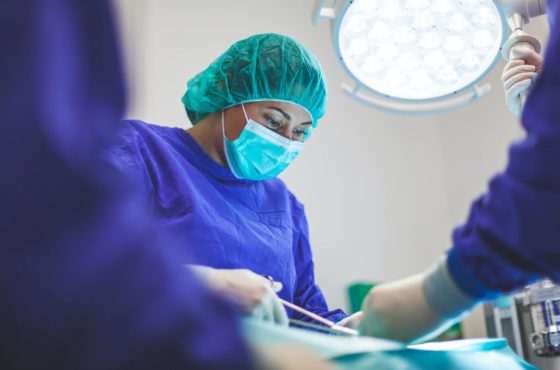
This revision surgery, however, may be more complicated and may carry more risks than the initial procedure.
What is a hernia mesh revision surgery and what are some of the reasons why a patient may need it?
Continue reading the article to learn more about this procedure which has also been cited by plaintiffs in the hernia mesh lawsuit.
What is a Hernia Mesh Revision Surgery?
Hernias are a common medical problem that occurs when an organ or tissue squeezes through a particularly weak spot in the abdominal wall. This condition may affect men, women, and even children.
The most common type of hernia is the inguinal hernia which occurs when a tissue, such as a part of the intestine, protrudes through a weak area in the abdominal muscles.
Inguinal hernia occurs at the inguinal canal – the crease between the lower abdomen and the leg. Men or pregnant women commonly develop this type of hernia.
The surgery used to fix a hernia is called a hernia repair. For many years, the use of hernia mesh in a hernia surgery has been the acceptable standard of care. In fact, every year, more than 100,000 hernia mesh devices are implanted in the United States alone.
But despite being a popular go-to by surgeons, complications related to the mesh have been making rounds lately, as these complications may ultimately result in a procedure called hernia revision surgery.
Hernia revision surgery is surgery that is done to keep the complications caused by a defective hernia mesh product used on the first hernia repair at a minimum.
However, because of this exact reason, the procedure can often be more complex, time-consuming, and risky. Revision surgery may mean removing the surgical mesh to be replaced with another medical device of its kind, or it may also be a complete removal of the mesh implant without being replaced.
Stitches or sutures may also be used as an alternative to the hernia mesh device. Whichever way the surgeon decides to go into, the risks of a hernia mesh revision surgery are still there, just like how risks are also a possibility after the initial procedure.
What Are Some Reasons For a Hernia Mesh Revision Surgery?
The most common hernia mesh complication that patients complain about and the leading reason why they undergo revision surgery is because of hernia mesh pain.
However, there are several other complications that also lead to mesh implant removal. Some of them include:
- bowel perforation
- infection
- bowel obstruction
- hernia recurrence
- allergic reactions to the surgical mesh
- mesh adhesions (bands of scar tissue that can fuse the surgical hernia mesh and the bowel together)
- nerve damage
- mesh migration
- sepsis
Some symptoms of these complications that require hernia mesh removal include fever, urinary problems, or swelling at the hernia surgery site.
Risks Associated With Removal of Defective Mesh
As with any other surgical procedures, revision surgery has its own risks. Just like what has been mentioned, revision surgery is more complicated compared to the initial hernia repair surgery.
In fact, the risks associated with the procedure may be similar to, if not more severe than the risks linked to the original hernia mesh repair surgery.
Some risks one may expect with a revision surgery include:
- bleeding
- infection
- nerve entrapment
- damage to organs or tissues
- bowel obstruction
- groin pain
- longer recovery time
The complications that can arise after a hernia revision surgery may not be limited to the risks mentioned above. For instance, the chances of a hernia coming back once again increase after each hernia recurrence.
Moreover, your body alone may not be the only one to suffer, as your emotional and mental health may be at risk as well. Acute pain may actually lead to post-operative depression, which can lower one’s pain tolerance, eventually resulting in increased pain and depression.
However, for patients suffering from chronic pain, the benefits of a revision surgery may just outweigh its risks.
Benefits of Revision Surgery
There are in fact many benefits in having a hernia mesh revision surgery that they may potentially outweight the risks associated with the procedure.
Some of these benefits include:
- an improvement in pain after mesh removal
- removal of an infected hernia mesh
- removal of a recalled mesh implant
- repair of any perforated or damaged organs or tissues
- putting an end to chronic pain associated with the defective hernia mesh device
- overcoming post-operative depression
Who is Eligible for Hernia Mesh Revision Surgery?
Whether you are qualified to undergo revision surgery will depend on some factors. Some examples are how severe the pain you are feeling is, and if medications will still work for that pain.
The doctor may also check for the presence of an infection, especially those that have already developed resistance to antibiotics, and if the mesh has already perforated or migrated to neighboring organs or tissues. You may also be eligible for the procedure if you have been implanted with a recalled mesh implant.
Your doctor may provide you with a more detailed risks and benefits of having revision surgery. This is why it’s very important to seek medical attention if you have any questions about the discomfort or pain you may feel after the initial hernia mesh surgery.
Recalled Hernia Mesh Products
The first hernia mesh recall was issued in late 2005 by Davol Inc., a subsidiary of C.R. Bard.
Moreover, in 2014, the FDA announced a number of additional hernia mesh recalls and started to warn patients and the public about the device.
The recalled products were pulled from the market because the devices have caused patients to suffer from serious injuries and side effects and they have also been associated with revision surgeries for hernia mesh.
Some of the companies targeted by the regulating agency were C.R. Bard for the potential risk of the defective mesh ring breaking apart and causing bowel obstruction or perforations, Ethicon Inc. for its Ethicon physiomesh and the potential hazard of the mesh losing its laminate coating, and Atrium Medical Corporation for packaging errors.
What You Can Do
A patient who had to undergo surgery for hernia mesh removal often suffer not only from a number of hernia mesh injury, but also from medical bills from the additional procedure which should not have happened in the first place.
Being able to hold abusive manufacturers accountable for the harm they have caused to unsuspecting patients may ultimately prevent them from causing more damages to other people in the future. One less hernia mesh victim is one less life ruined by injuries, side effects, and additional surgeries from the device.
If you or your loved one has suffered from serious injuries with the use of hernia mesh implants, you may be eligible for compensation. Contact us today and if you qualify for a hernia mesh case, we may be able to connect you with the right hernia mesh lawyer to help you with your legal needs.


